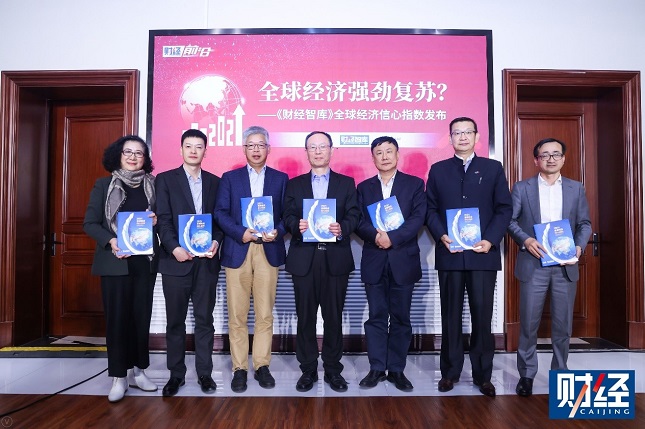SABIC Partners With Caijing Magazine & Caijing Think Tank To Launch “2021 Global Economic Confidence Index”
12/04/2021
Yesterday, SABIC, a global leading diversified chemical company, joined hands with Caijing Magazine and Caijing Think Tank to launch the 2021 Global Economic Confidence Index (GECI) in Beijing. During the launch event, eight prominent experts and leaders including Li Lei, Vice President and Regional Head, North Asia, SABIC, conducted an in-depth analysis and prospect forecast on a series of hot topics such as global economic recovery, drivers of China’s economic growth, global economic transformation after the pandemic, Sino-US economic and trade, and the new frontlines and trends that are leading economic growth.
Other leaders present were Zhu Min, Chairman, National Institute of Financial Research (NIFR) at Tsinghua University and Former Deputy Managing Director, IMF; Wang Yiming, Vice Chairman of China Center for International Economic Exchanges, member of the Economic Committee of the 13th CPPCC National Committee and member of the Monetary Policy Committee, People’s Bank of China; Cai Fang, Chairman, Chief Expert of the Chinese Academy of Social Sciences’s National Institute for Global Strategy, member of the Central Bank’s Monetary Policy Committee; Huang Yiping, Deputy Dean, National School of Development at Peking University; Zhang Yansheng, Chief Research Fellow, China Center for International Economic Exchanges; Liu Yuanchun, Vice President, Renmin University of China; Xu Zhaoyuan, Deputy Director General, Research Department of Industrial Economy at Development Research Center of the State Council; and Zhang Yandong, Managing Editor of Caijing Magazine, President of Caijing Think Tank.
According to Li Lei, manufacturing enterprises are required to play a more important role as drivers to shift the economy from virtual to real growth. “The chemical industry has always been a key basis industry and pillar industry and plays an important role in the manufacturing sector. The development of new energy, 5G and other emerging sectors in recent years has seen continued growth in specialty chemicals, new materials and other chemical subsectors,” he said. “In the new round of ‘new infrastructure’ and ‘new urbanization’ boom, support from the chemical industry remains central to various activities and sectors including the construction of 5G base stations and intercity railway, shared mobility, and popular sectors such as pharmaceuticals and bioengineering. It is precisely because of new demand from these emerging sectors that the chemical industry has continued to innovate and upgrade.”
The GECI survey was first launched in early 2020, when the Covid-19 pandemic broke out and impacted worldwide. The result of 2020 Global Economic Confidence Index (31.4), highlighted a lack of confidence from respondents in the global economy and the possible closure of the ten-year-long global economic expansion. This year's survey mainly covers world-renowned economists, top minds in governments, business and finance sectors and financial media professionals. The respondents are showing strong confidence toward all major regions, with an index value of over 100, underlines the forecast for 2021 economic growth is much higher than 2020.
Key Findings:
- Most of the respondents believed that the Chinese economy would rebound significantly, and foreign trade would continue to grow steadily.
- Policies that enhance consumption would have limited effect in the short term. This is particularly the case in China where the income gap is so large. The income levels of a fairly large number of households remain quite low, and the social security system is still inadequate. Many households have relatively large concerns about increasing consumption. Hence, for domestic demand to play a substantive role, all-round policy coordination is required.
- Most respondents believed that China’s position as the “world’s factory” would remain generally secure, and their confidence in breaking through key technology and key components had increased.
- Respondents were most concerned about government and/or corporate debt risks for both the world and China, as well as the financial volatility that they could trigger.
In the area of industry thought leadership, in addition to the launch of GECI for two consecutive years together with Caijing Magazine and Caijing Think Tank, SABIC continues to actively strengthen its strategic partnership with Boao Forum for Asia (BFA), driving regional economic integration and exchanges, and promoting dialogue and economic ties between Asia and the rest of the world. On April 18, SABIC will participate in the 2021 Annual Conference of BFA and the 20th anniversary of the forum as an honorary strategic partner.

SABIC joined hands with Caijing Magazine and Caijing Think Tank to launch “2021 Global Economic Confidence Index”
